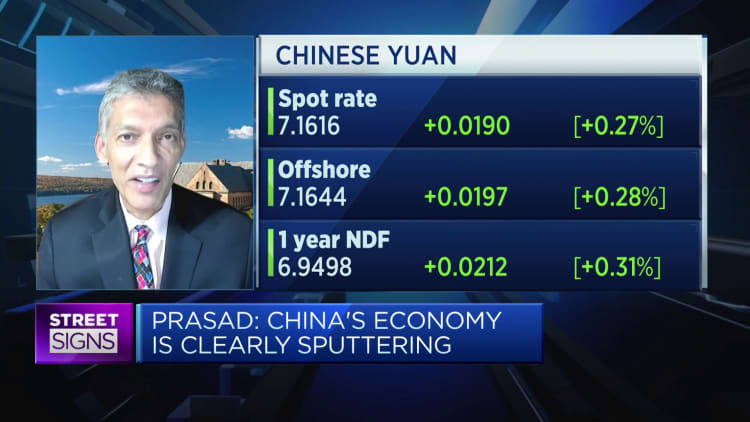Asia’s factories face weak demand, signaling growth challenges ahead

A worker welds in the workshop of a machinery and equipment manufacturing enterprise in Qingzhou Economic Development Zone, East China’s Shandong province, July 17, 2023.
Future Publishing | Future Publishing | Getty Images
Factories in Asia reported sluggish demand in July as new domestic and global orders slumped at the start of the third quarter, underscoring the lingering weak momentum in the global economy.
Six out of the nine private surveys released Tuesday showed that manufacturing activity in Asia’s major producers again contracted in July. The reading for China unexpectedly slipped into contraction for the first time in three months.
In addition to China, readings for Japan, South Korea, Malaysia, Taiwan, Vietnam also signaled contraction in manufacturing activity. Only those for India, Indonesia and the Philippines pointed to expansion.
“Manufacturing PMIs remained in contractionary territory across most of Emerging Asia last month and the underlying data point to further weakness ahead,” Shivaan Tandon, emerging Asia economist with Capital Economics, wrote in a note Tuesday.
“Falling new orders, bleak employment prospects and high inventory levels point to subdued factory activity in the coming months,” he added. “The data reaffirm our view that external demand will constitute a headwind to growth in the second half of 2023.”
Weak demand also partly contributed to reduced production costs, which may alleviate inflationary pressures and eventually lead to looser monetary policy in some emerging Asian economies.

The manufacturing purchasing managers’ index reading for Taiwan was particularly dire, slipping to 44.1 in July from 44.8 in June, according to S&P. The pace of decline was the sharpest recorded since November 2022.
PMI manufacturing surveys are leading indicators of economic activity. A reading above 50 points to an expansion in activity, while a reading below that level suggests a contraction.
Weak new orders
New export business in Taiwan — a leading global producer of semiconductors — contracted at the steepest rate for six months, S&P said in its July PMI release for Taiwan. Firms surveyed pointed to reduced demand across a variety of markets, including Europe, Japan, mainland China and the United States.
In Taiwan, “declines in output, new orders and export sales all gathered pace, with firms blaming weaker global economic conditions and high inventory levels at clients,” said Annabel Fiddes, S&P Global Market Intelligence’s associate director for economics.
The same drop in new orders was also seen in other East Asian economies.
Rates of contraction in Vietnamese output, new orders and employment in July were either the weakest or joint-weakest since March.

In China, the Caixin/S&P PMI reading fell to 49.2 in July from 50.5 the previous month. It was the first contraction in three months and lower than the median forecast for 50.3 in a Reuters poll.
This was driven by a fall in new businesses received by China’s producers in July, which contrasted with rising sales volumes in the preceding two months, Caixin/S&P said. New export business also contracted at a solid pace that was the fastest since September last year, according to the survey.
Falling price pressures
The weak demand for Asia’s factory output, though, helped reduce production costs.
In Japan, manufacturers signaled that input price inflation continued to decline at the start of the third quarter, “with the latest increase in operating expenses the slowest in close to two-and-a-half years and broadly in line with the long-run series average.”
South Korea’s input prices in July fell at the fastest pace since July 2017, while those in Taiwan fell by the second-sharpest since May 2020.
Taiwanese manufacturers cited competitive pricing strategies and price negotiations with clients and improved material availability in July. They were then able to often pass on cost savings on to customers as sale prices were cut at the quickest pace in over three years, S&P said.

“Sub-indices for both input and output prices stood near multi-year lows and point to further falls in inflation in the near-term,” Capital Economics’ Tandon said, referring to emerging East Asian economies.
As it stands, the latest official government data showed inflation in South Korea slowed to 2.7% in June from a 6.3% peak about a year ago, while inflation in Taiwan stood at almost 1.8% in June from a peak about a year ago.
“The latest data support our view that price pressures are likely to soften steadily in the near-term and, with growth set to struggle and remain well below-trend, central banks in the region are likely to start cutting interest rates soon,” he added.




